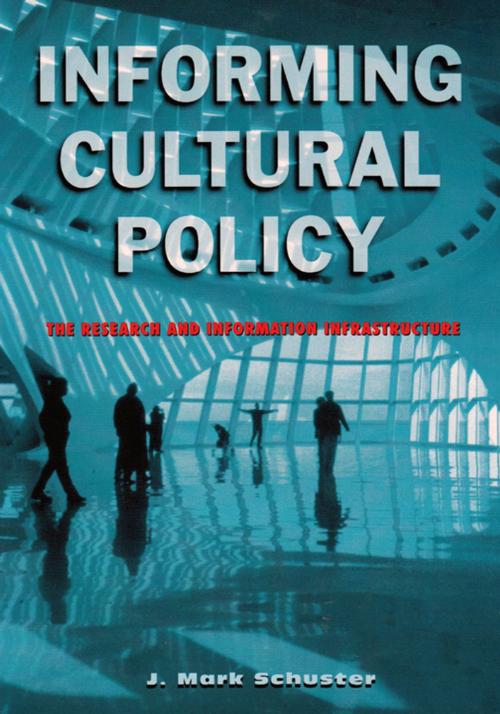Informing Cultural Policy
The Information and Research Infrastructure
Nonfiction, Social & Cultural Studies, Social Science, Sociology| Author: | J. Mark Schuster | ISBN: | 9781351512435 |
| Publisher: | Taylor and Francis | Publication: | September 4, 2017 |
| Imprint: | Routledge | Language: | English |
| Author: | J. Mark Schuster |
| ISBN: | 9781351512435 |
| Publisher: | Taylor and Francis |
| Publication: | September 4, 2017 |
| Imprint: | Routledge |
| Language: | English |
In any policy arena, the crafting of effective policy depends on the quality of the information infrastructure that is available to the participants in that arena. Such an information infrastructure is designed, developed, and managed as a critical element in policy formulation and implementation. While various attempts have been made to map the extent of the existing cultural policy information infrastructure in the United States, no structured attempt has been made to conduct a cross-national analysis intended to draw on the more highly developed models already in operation elsewhere.A cross-national comparative look provides valuable information on how this infrastructure has evolved, on what has succeeded and what has had less success, on what is sustainable and what is not, and on how the range of interests of the various individuals and institutions involved in the cultural policy arena can best be accommodated through careful design of the information infrastructure.In Informing Cultural Policy, international cultural policy scholar and researcher J. Mark Schuster relates the findings of a study that took him from North America to Europe to gain understanding of the cultural policy information infrastructure in place abroad. His findings are structured into a taxonomy that organizes the array of research and information models operating throughout the world into a logical framework for understanding how the myriad cultural agencies collect, analyze, and disseminate cultural policy data. Schuster discusses private- and public-sector models, including research divisions of government cultural funding agencies, national statistics agencies, independent nonprofit research institutes, government-designated university-based research centers, private consulting firms, cultural ""observatories,"" non-institutional networks, research programs, and publications. For each case study undertaken, the author provides the Internet address, names, and information for key conta
In any policy arena, the crafting of effective policy depends on the quality of the information infrastructure that is available to the participants in that arena. Such an information infrastructure is designed, developed, and managed as a critical element in policy formulation and implementation. While various attempts have been made to map the extent of the existing cultural policy information infrastructure in the United States, no structured attempt has been made to conduct a cross-national analysis intended to draw on the more highly developed models already in operation elsewhere.A cross-national comparative look provides valuable information on how this infrastructure has evolved, on what has succeeded and what has had less success, on what is sustainable and what is not, and on how the range of interests of the various individuals and institutions involved in the cultural policy arena can best be accommodated through careful design of the information infrastructure.In Informing Cultural Policy, international cultural policy scholar and researcher J. Mark Schuster relates the findings of a study that took him from North America to Europe to gain understanding of the cultural policy information infrastructure in place abroad. His findings are structured into a taxonomy that organizes the array of research and information models operating throughout the world into a logical framework for understanding how the myriad cultural agencies collect, analyze, and disseminate cultural policy data. Schuster discusses private- and public-sector models, including research divisions of government cultural funding agencies, national statistics agencies, independent nonprofit research institutes, government-designated university-based research centers, private consulting firms, cultural ""observatories,"" non-institutional networks, research programs, and publications. For each case study undertaken, the author provides the Internet address, names, and information for key conta















